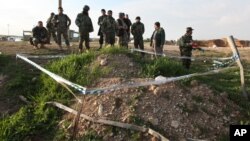It has been nine years since ISIS conducted a genocidal campaign against the Yezidi community in northern Iraq. On August 3, U.S. State Department Spokesperson Matthew Miller said in written statement, “Today we remember the victims and stand in solidarity with survivors of the Yezidi genocide perpetrated by ISIS terrorists.”
By 2014, ISIS had seized large swaths of territory in Syria and Iraq. In August of that year, as its fighters conquered the town of Sinjar and the surrounding countryside, ISIS began to systematically kill, enslave, and kidnap Yezidis to destroy the people and their culture. Thousands were murdered or abducted - boys forced to become child soldiers; women and girls sold into sexual slavery. As State Department Spokesperson Miller noted, “The number of people killed remains unknown, and discoveries of mass graves continue.”
The Sinjar district was devastated by ISIS and by the successful efforts to drive it out. Tens of thousands of Yezidis fled to displaced persons camps in the Kurdistan region and some into exile abroad. Infrastructure was decimated and the security situation has remained unstable with the presence of various militias supporting different factions.
A political logjam also developed between the Government of Iraq and the Kurdistan Regional Government. In 2020, to break the impasse and create conditions for Yezidis to return home, the parties signed the Sinjar Agreement, aimed at setting up a new administration and security structure. The accord has not yet been implemented. Spokesperson Miller called for its “full implementation,” along with the Yezidi Survivors’ Law, “in consultation with the communities that call Sinjar home.”
U.S. support for the Yezidi community is “unwavering,” said Spokesperson Miller. “We continue to press for justice and accountability for victims and survivors and respect for the human rights of all Yezidis, including the freedom of religion or belief ... By pursuing justice and accountability, addressing the drivers of violence, and preventing genocide and other atrocities in the future, Iraq has the opportunity to embark on a new path that leads to greater peace, stability and prosperity for all of its communities.”
“With this approach,” Spokesperson Miller declared, “Iraq can serve as an example of mutual respect and coexistence for the region and the world. Yezidis are crucial in this effort. So while we keep alive the memory of the victims and recognize the survivors and their suffering, we also honor the strength, resilience, and determination of Yezidis.”














